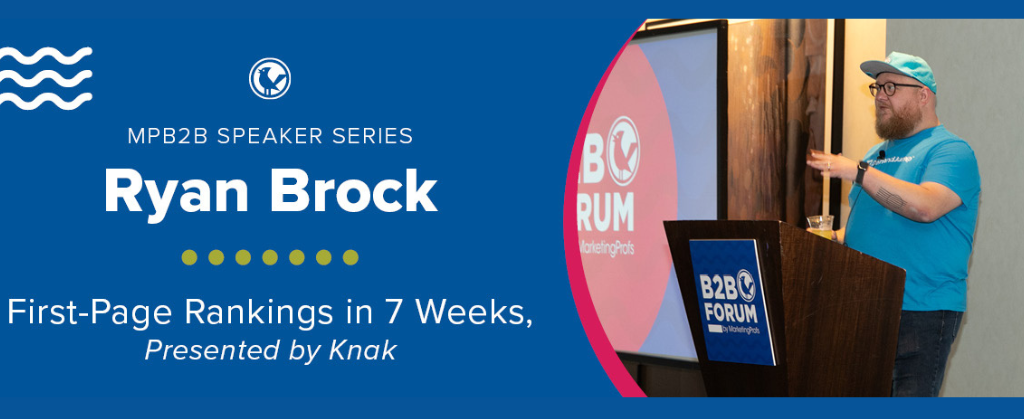
How is SEO ranking determined?
Yes, there are keywords and key phrases, links, and domain authority to consider.
But to get high SEO rankings, you have to provide valuable content that your market actually cares about—and give it to them, step by step.
How can you find what your market cares about?
By mapping a person’s most likely search journey to learn about a topic, says Ryan Brock from DemandJump, you can address each specific question as an individual step along that journey.
Ryan shows you how in this clip from MarketingProfs B2B Forum. Watch the video or read the transcript below.
I know this [slide] looks like absolute nonsense.
And I don’t intend for you to actually be able to read it. Unless maybe if you’re at home you can, on your screen.
But this is the entire market for authority—therefore, the market for organic traffic—around the topic of “hurricane season.”

If you search “hurricane season,” Google has already done a ton of work to understand what you’re more likely than not going to want to search next.
That’s why they give you around four or five “people also ask” questions pretty high up there on the search engine results page. And that’s why they give you related searches at the bottom of that first page or after the first 10 results, however your experience looks.
Now, what Google’s effectively saying there is, “we’re not a hundred percent sure that you’re going to want any one of these terms specifically. But we’re like 99% sure you’re going to want one out of the 12 that we’re showing you right now.”
They’ve seen so many people search for “hurricane season.” They understand that people want to learn these specific ways. There’s branching pathways around it.
What this represents here is that on a global scale. So if you start with the topic of “hurricane season” and you look at those recommendations, then you search all of those recommendations and you grab the recommendations on those pages, and you do that at least four times, you end up with a really good understanding of all the different ways Google believes you are more likely than not going to want to learn about a topic.
It doesn’t mean that there’s one flow that we think most people are going to want to go down. What it means is, along all these different branching pathways, starting with different terms related to hurricane season and going to another term about hurricane season, we understand—statistically speaking—how the market tends to move.
We know that at any point in time, any random customer is more likely than not going to search some of these terms.
Now, if you zoom in on it, this is what it kind of looks like.

(Let’s go back from hurricane season. Nobody here needs to know about that. I’m from Indiana. I don’t care about hurricanes at all. But SaaS content, I do care about.)
So if we were to zoom in on that, this is kind of what it looks like.
Let’s say we started with SaaS content. In the center of our network… think of it like a spiderweb. Right in the center, we have SaaS content as a keyword phrase. That is the context through which all of the rest of the network needs to be seen.
If we start looking at all the different ways you could go next based on Google’s recommendations, we eventually find that topics like “SaaS content strategy,” “SaaS marketing course,” and “SaaS marketing tools” are the next steps. These are more likely the not next step.
And then beyond that, if someone happens to go from “SaaS content,” to “SaaS marketing tools,” a question like, “what is the best SEO tool for SaaS companies?” becomes a really likely next step for them.
And when I say, “next step,” I don’t necessarily mean one after another. I mean, people can move backwards, forwards, and this is how we all shop, right?
We expect that all of us can just ask whatever question pops into our head and that someone out there is going to answer that question for us, right?
I don’t have to ask the question the way that Google wants me to. I can ask it the way that I want to. And this is kind of a reflection of that. There are a million different ways that people can move in order to learn about something.
What matters isn’t that we do them in the right order, that we have a funnel that’s built properly, that we can move people from the top to the bottom.
What matters is, we think of each one of these bubbles as a step and each one of the links between them as a road.
And if we can calculate statistically what are the roads most traveled and make that the content we write on our website, that’s a shortcut to topical authority. And it’s a shortcut that works because it’s not a shortcut, it’s just us understanding what the market actually cares about.
Published 11/08/23
B2B Forum is packed with marketing insights, strategies, and tactics taken from the real world experience of over forty industry experts, packaged into context you can actually put to use.
Join us in Boston for B2B Forum 2024 this coming November 12-14, 2024. Early buyers get B2B Forum tickets at their lowest rate, and discounted hotel rooms are available while they last.